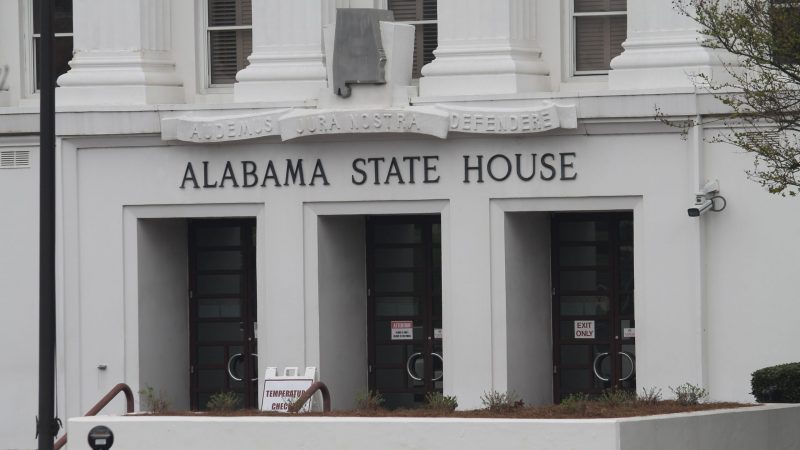Budgets head to the governor after early morning vote
Alabama lawmakers worked the late shift giving final passage to a $3 billion general fund budget and an $8.8 billion education budget early Friday morning. They also sent a plan for one-time tax rebates to the governor.
“This year, budgets are flush. There’s historic revenue in the Education Trust Fund. There’s even $2.8 billion extra they weren’t even counting on,” said Todd Stacy, host of Capitol Journal on Alabama Public Television.
Stacy discussed that and other action in the legislature this week.
Big bucks
The general fund budget and a supplemental spending bill now goes to Gov. Kay Ivey and came after sometimes tense disagreements. Some lawmakers said their districts had been neglected. Lawmakers had also disagreed over how much to spend in the upcoming fiscal year because of concerns about a possible economic downturn.
The education budget and its $2.8 billion supplemental spending package also head to the governor’s desk. The spending plan includes a 2% pay increase for education employees.
Meanwhile, after much debate, legislators settled on a compromise amount for one-time tax rebates of $150 for single filers and $300 for married couples. That’s less than the $400 for singles and $800 for married couples Ivey had proposed. The final proposal, which would cost the state an estimated $393 million, is now in her hands, but she could send it back to lawmakers with an executive amendment.
“I’m going to be really curious, especially since she’s been invested on this tax rebate issue, if she might have an amendment to bring it back to the level that she had or at least closer,” Stacy said.
Lawmakers reduced the size of the rebates in favor of putting more of the surplus into an education savings account which is under legislative control.
Sales tax on groceries reduced
The House Thursday passed a plan to gradually halve the state’s 4% sales tax from groceries. It would remove the tax by one percentage point a year, provided there is enough growth in tax collections to offset the revenue loss, until the tax drops to 2%.
“Maybe in years to come, they can repeal the full 4%, but they want to wait and see,” Stacy said.
The 4% tax provides more than $600 million annually to the state for education funding, according to estimates from the Legislative Services Agency. Efforts to remove the tax over the last two decades largely faltered because of concerns about the loss to education funding.
The proposal proved popular with every senator and nearly every representative signing on as co-sponsors. Todd attributed that to this year’s unusually large tax collections.
“That’s a big difference this year in giving lawmakers the confidence that they can make this cut without doing too much damage to the Education Trust Fund,” Stacy said.
The bill now moves to the Senate.
Changes to the Alabama Accountability Act
Ten years ago, lawmakers passed the Alabama Accountability Act which offered scholarships to families with children in so-called failing schools. Parents could use that money for private school tuition or to move to another public school.
On Tuesday, after hours of debate, the Senate passed changes to the law which would expand who can participate. It raises the income threshold for families to qualify along with raising the cap for scholarship to $10,000 for all grade levels.
The new bill also does away with the term “failing” school which was defined as the bottom 6% of schools by test scores. Now, schools that receive a “D” or “F” on the state Department of Education’s report card would be deemed “priority” schools. That would expand the number of schools where students would be eligible for scholarships from 79 to 212.
The bill now moves to the House.
“I think it has the support,” Stacy said. “It was a long filibuster in the Senate, but I think the House will deal with it in pretty short order.”
An official state cookie
Alabama has numerous state symbols from the state bird (yellowhammer) to the state rock (marble) to the state renaissance fair (Alabama Renaissance Faire). Now it’s on the cusp of having an official state cookie.
The yellowhammer cookie is the creation of 4th and 12 grade students from Montgomery and features Alabama-based ingredients.
“The best way I can describe it is it’s almost like a peanut butter cookie with peanuts and pecans meshed inside it,” Stacy said.
The bill designating the state cookie received final approval in the Senate Thursday. It now goes to Ivey.
Other action
Alabama lawmakers approve loan bill for Birmingham-Southern, other colleges
Clock runs out on Alabama bill to require unanimous jury for death penalty
Expansion of Alabama’s “Don’t Say Gay” law won’t move this year, says committee chair
Alabama Senate passes amended version of former gang bill
Bill to criminalize help with absentee ballots advances in the Senate
Alabama lawmakers attempt to define ‘what is a woman’
Includes reporting from the Associated Press
Pakistan claims to have killed at least 70 militants in strikes along Afghan border
Pakistan's military killed at least 70 militants in strikes along the border with Afghanistan early Sunday, the deputy interior minister said.
Team USA faces tough Canadian squad in Olympic gold medal hockey game
In the first Olympics with stars of the NHL competing in over a decade, a talent-packed Team USA faces a tough test against Canada.
PHOTOS: Your car has a lot to say about who you are
Photographer Martin Roemer visited 22 countries — from the U.S. to Senegal to India — to show how our identities are connected to our mode of transportation.
Looking for life purpose? Start with building social ties
Research shows that having a sense of purpose can lower stress levels and boost our mental health. Finding meaning may not have to be an ambitious project.
Sunday Puzzle: TransformeR
NPR's Ayesha Rascoe plays the puzzle with listener Joan Suits and Weekend Edition Puzzlemaster Will Shortz.
Danish military evacuates US submariner who needed urgent medical care off Greenland
Denmark's military says its arctic command forces evacuated a crew member of a U.S. submarine off the coast of Greenland for urgent medical treatment.






